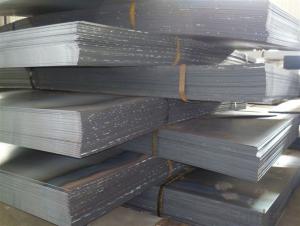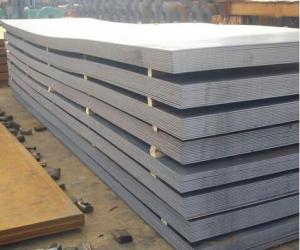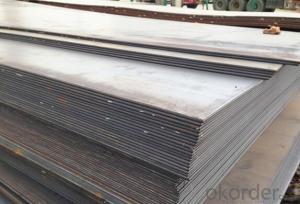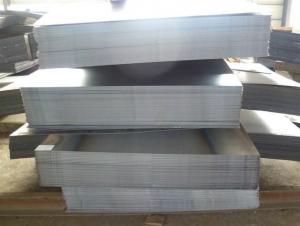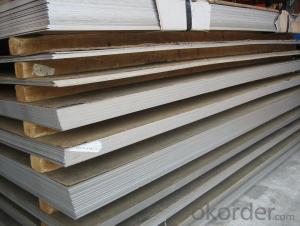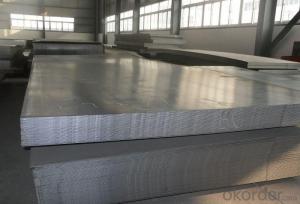Hot Rolled Oil Tank_Carbon Boiler Steel Plate_Sheet A36_A516 Gr.60_Gr.70
- Loading Port:
- Tianjin
- Payment Terms:
- TT OR LC
- Min Order Qty:
- 3 m.t.
- Supply Capability:
- 10000 m.t./month
OKorder Service Pledge
OKorder Financial Service
You Might Also Like
Item specifice
Prime Hot Rolled Carbon Steel Plate_Sheet Dimensions
Thickness:0.6-200mm
Width:1000-4000mm
MOQ: 1 ton
Certificate:ISO,SGS
Specification of Hot Rolled Carbon Steel Plate_Sheet
Commodity | Prime hot rolled carbon steel plate / sheet dimensions |
Thickness | 0.6-200mm |
Width | 1000-4000mm |
Length | as custom's request |
Technique | Cold rolled or hot rolled mild steel plate |
Surface treatment | Bare, galvanized coated or as customer's requirements. |
Standard | ASTM,EN,GB,JIS |
Material | A283Gr.D/A573Gr.65,A516Gr65,A516Gr70,A284Gr.D SS400,SS300,CCSB A36,A32,LRA32,LRB,Q235 SAE1010,SAE1020,SAE1045,Q195,Q235,Q345,SS400,ASTM A36,E235B mild steel plate |
Usage | the mild steel plate will used in home appliances construction, machinery manufacturing, container manufacturing, shipbuilding, bridges, etc. |
Terms of Payment | 30% T/T as deposit and 70% T/T balance againest B/L copy. |
Delivery Detail | Within 3-15 days after receipt of deposited for the mild steel plate |
CNBM Introduction of the Hot Rolled Carbon Steel Plate_Sheet Supplier
CNBM International Corporation is the most import and export platform of CNBM group(China National Building Material Group Corporation) ,which is a state-owned enterprise, ranked in 270th of Fortune Global 500 in 2015.
With its advantages, CNBM International are mainly concentrate on Cement, Glass, Iron and Steel, Ceramics industries and devotes herself for supplying high quality series of refractories as well as technical consultancies and logistics solution.
After-sale service |
|
Advantages
|
|
Packaging & Delivery of the Hot Rolled Carbon Steel Plate_Sheet
Packaging Detail | Sea worthy packing /as per customer's packing instruction |
Delivery Detail | 15 ~ 40 days after receiving the deposit |
Products
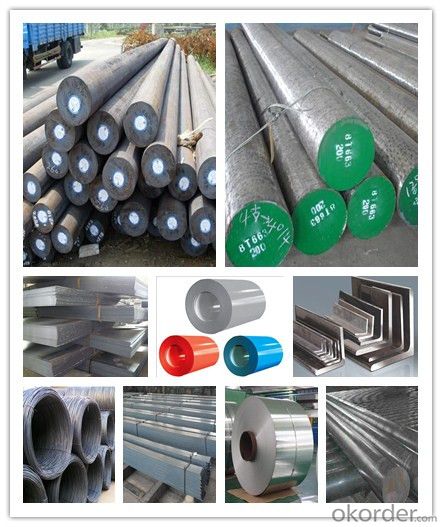
FAQ:
Are you a trading company or manufacturer? | Manufacturer |
What’s the MOQ? | 3 metric ton |
What’s your delivery time? | 15-35 days after downpayment received |
Do you Accept OEM service? | Yes |
what’s your delivery terms? | FOB/CFR/CIF |
What's the Payment Terms? | 30% as deposit,70% before shipment by T/T |
Western Union acceptable for small amount. | |
L/C acceptable for large amount. | |
Scrow ,Paybal,Alipay are also ok | |
Why choose us? | Chose happens because of quality, then price, We can give you both. Additionally, we can also offer professional products inquiry, products knowledge train (for agents), smooth goods delivery, excellent customer solution proposals. |
What's your available port of Shipment? | Main Port, China |
What’s your featured services? | Our service formula: good quality+ good price+ good service=customer's trust
|
Where are your Market? | Covering more than 160 countries in the world |
- Q:How is special steel used in the production of valves and fittings?
- Special steel plays a crucial role in the production of valves and fittings due to its unique properties and characteristics. Valves and fittings are essential components used in various industries, including oil and gas, chemical, petrochemical, and power generation. Special steel, also known as alloy steel, offers superior strength, corrosion resistance, and durability compared to regular carbon steel. These qualities make it an ideal material for manufacturing valves and fittings that are subjected to high pressure, extreme temperatures, and corrosive environments. In valve production, special steel is commonly used for the valve body, bonnet, stem, and other critical parts. The valve body is responsible for housing the internal components and sealing the flow of fluids or gases. Special steel's high tensile strength and resistance to deformation ensure the valve body can withstand the pressure and maintain a tight seal, preventing leaks. Similarly, special steel is used in the production of fittings, which are used to connect pipes or other equipment in a fluid or gas system. Fittings made from special steel can withstand high pressures, temperature fluctuations, and corrosive media, ensuring a reliable and leak-free connection. Special steel alloys, such as stainless steel or duplex stainless steel, are often selected for their excellent corrosion resistance. They can withstand harsh environments, including exposure to chemicals, saltwater, and acidic or alkaline substances. This corrosion resistance is crucial in preventing valve and fitting failure, maintaining system integrity, and avoiding costly downtime or accidents. Moreover, special steel can be tailored to meet specific requirements, such as high-temperature resistance, low-temperature toughness, or excellent wear resistance. This allows manufacturers to customize valves and fittings based on the specific application and operating conditions, ensuring optimal performance and longevity. In summary, special steel is extensively used in the production of valves and fittings due to its exceptional strength, corrosion resistance, and durability. Its properties allow valves and fittings to perform reliably in demanding environments, ensuring safe and efficient operations in various industries.
- Q:How does special steel perform in high-vibration environments?
- Special steel is specifically designed to withstand high-vibration environments. Its unique composition and metallurgical properties make it highly resistant to fatigue, cracking, and deformation caused by vibrations. Additionally, special steel exhibits superior damping capacity, effectively absorbing and dissipating vibrations, thus reducing the risk of structural damage or failure in high-vibration environments.
- Q:Can special steel be used for making mining equipment?
- Yes, special steel can be used for making mining equipment. Special steel refers to steel alloys that have been specifically designed and manufactured to possess certain properties and characteristics that make them suitable for specific applications. In the case of mining equipment, special steel is often used due to its exceptional strength, toughness, and resistance to wear and corrosion. Mining equipment is subjected to extreme conditions, such as heavy loads, impact, abrasion, and exposure to harsh environments. Special steel grades, such as high-strength low-alloy (HSLA) steel, tool steel, and wear-resistant steel, are commonly employed in the manufacturing of mining equipment to ensure their durability and performance under these demanding circumstances. Special steel allows mining equipment to withstand the stresses and strains encountered during excavation, hauling, and processing of minerals. It can be used for the fabrication of components like bucket teeth, drill bits, cutting edges, and crusher parts, which need to resist wear and maintain their strength even when exposed to abrasive materials. Moreover, certain types of special steel, such as stainless steel, are particularly suitable for mining operations where equipment comes into contact with corrosive substances like acids or moisture. Stainless steel exhibits excellent corrosion resistance, making it suitable for applications such as pipes, tanks, and conveyors used in mining operations. In conclusion, special steel can indeed be used for making mining equipment. Its superior strength, toughness, wear resistance, and corrosion resistance make it a preferred choice for manufacturing various components and structures used in the mining industry.
- Q:How does special steel contribute to the thermal conductivity of products?
- Special steel can significantly contribute to the thermal conductivity of products due to its unique composition and properties. Special steel is manufactured with specific alloying elements, such as chromium, nickel, molybdenum, or vanadium, which enhance its thermal conductivity. These alloys help in the efficient transfer of heat by increasing the free electron density within the steel. The presence of alloying elements in special steel improves its lattice structure, allowing for better heat transfer. The increased free electron density enables quick and efficient movement of thermal energy through the material. As a result, special steel can effectively conduct heat from one area to another, making it ideal for applications requiring high thermal conductivity. Furthermore, special steel is often processed using advanced techniques like heat treatment, forging, or rolling, which further optimize its properties. These processes refine the microstructure of the steel, reducing impurities and improving its thermal conductivity. The resulting steel product exhibits enhanced heat transfer capabilities and provides efficient thermal management. The high thermal conductivity of special steel makes it highly desirable for various industries and applications. It is commonly used in the manufacturing of heat exchangers, boilers, furnaces, and other thermal equipment where efficient heat transfer is crucial. Additionally, special steel is often employed in electrical appliances, such as stovetops or induction cookers, where rapid and uniform heat distribution is necessary. In summary, special steel contributes to the thermal conductivity of products by utilizing specific alloying elements and advanced processing techniques to enhance its heat transfer capabilities. Its high thermal conductivity makes it a valuable material for various industries, ensuring efficient heat management and optimal performance of thermal equipment and appliances.
- Q:What are the main characteristics of tool steel forgings?
- Tool steel forgings have several main characteristics that make them highly desirable for a variety of applications. First and foremost, tool steel forgings are known for their exceptional durability and strength. They are specifically designed to withstand high levels of stress, making them ideal for applications where toughness and resistance to wear and tear are crucial. This strength allows tool steel forgings to maintain their shape and integrity even under extreme conditions, such as high temperatures or heavy loads. Another key characteristic of tool steel forgings is their excellent hardness. Tool steel is able to achieve high levels of hardness through a process called quenching and tempering, which involves heating the steel to a specific temperature and then rapidly cooling it. This hardness makes tool steel forgings highly resistant to abrasion, making them suitable for cutting, shaping, and forming materials. Additionally, tool steel forgings exhibit excellent dimensional stability. This means that they have minimal distortion or shrinkage when subjected to heat or pressure, making them ideal for precision tooling applications. Their dimensional stability also ensures that the forgings maintain their accuracy and reliability over time, which is essential in industries such as manufacturing and engineering. Furthermore, tool steel forgings offer good machinability, meaning they can be easily shaped, drilled, and cut to meet specific requirements. This makes them versatile and adaptable for a wide range of applications, from forming complex shapes to creating intricate designs. Lastly, tool steel forgings have excellent wear resistance. This characteristic allows them to maintain their cutting edges and surfaces for extended periods, reducing the need for frequent sharpening or replacement. This wear resistance is particularly advantageous in industries such as automotive, aerospace, and tool manufacturing, where longevity and efficiency are paramount. In conclusion, the main characteristics of tool steel forgings include exceptional durability and strength, high hardness, excellent dimensional stability, good machinability, and excellent wear resistance. These characteristics make tool steel forgings highly sought after in various industries, where reliability, precision, and longevity are critical.
- Q:How does special steel contribute to energy efficiency?
- Special steel contributes to energy efficiency in several ways. Firstly, special steel alloys are often used in the manufacturing of energy-efficient appliances, such as refrigerators and air conditioners. These steel alloys have enhanced heat transfer properties, allowing for more efficient cooling and heating processes, thereby reducing energy consumption. Secondly, special steel is commonly used in the construction of energy-efficient buildings and infrastructure. Its high strength and durability enable the creation of lightweight and sustainable structures, which require less energy for heating, cooling, and maintenance. Moreover, special steel plays a crucial role in renewable energy technology. It is used in the production of wind turbines, solar panels, and hydroelectric power plants, enhancing their efficiency and overall performance. The unique properties of special steel, such as corrosion resistance and high tensile strength, make it ideal for withstanding harsh environmental conditions and maximizing energy generation. In summary, special steel contributes to energy efficiency by enabling the development of energy-efficient appliances, constructing sustainable buildings, and optimizing renewable energy technologies. Its utilization in various industries helps reduce energy consumption and promote a more sustainable future.
- Q:What are the mechanical properties of special steel?
- Special steels, also known as alloy steels, possess enhanced mechanical properties compared to regular carbon steels. These properties vary depending on the specific alloying elements and their concentration. Some common mechanical properties of special steel include: 1. High tensile strength: Special steels are known for their exceptional strength, making them suitable for applications that require high load-bearing capacity. The tensile strength of these steels can range from 500 MPa to over 2,000 MPa, depending on the composition. 2. Improved hardness: Alloying elements in special steels can significantly increase their hardness. This property is desirable for applications that require resistance to wear and abrasion. Special steels can achieve hardness levels ranging from 200-600 HB (Brinell hardness), depending on the specific alloy composition and heat treatment. 3. Good toughness: Special steels often exhibit good toughness, which refers to the ability to absorb energy before fracturing. This property is crucial for components subjected to impact or dynamic loading. The combination of high strength and toughness makes special steels suitable for demanding applications such as automotive parts or industrial machinery. 4. Excellent fatigue resistance: Special steels are designed to withstand cyclic loading without failure. They exhibit enhanced fatigue resistance, allowing them to endure repeated stress cycles without compromising their structural integrity. This property makes special steels ideal for critical components in aerospace, automotive, and machinery industries. 5. Superior corrosion resistance: Depending on the alloy composition, special steels can offer improved corrosion resistance compared to regular carbon steels. The addition of elements like chromium, nickel, or molybdenum helps to form protective oxide layers on the surface, preventing corrosion and increasing durability. 6. High temperature resistance: Some special steels are specifically formulated to perform well at elevated temperatures. They possess excellent heat resistance and can retain their mechanical properties even at extreme temperatures. This property is crucial for applications such as turbine blades, exhaust systems, or high-temperature furnaces. It is important to note that the specific mechanical properties of special steel can vary widely depending on the specific alloy composition, heat treatment, and processing techniques used. Therefore, it is essential to consult the material specifications or consult with experts to determine the exact mechanical properties of a particular special steel.
- Q:How does special steel contribute to the efficiency of industrial equipment?
- Special steel contributes to the efficiency of industrial equipment by offering superior strength, durability, and resistance to wear and tear. Its unique properties enable the production of lighter and more compact equipment, resulting in reduced energy consumption, increased productivity, and improved overall performance. Additionally, special steel's high corrosion resistance helps to prolong the lifespan of industrial equipment, reducing maintenance costs and enhancing operational efficiency.
- Q:What are the applications of corrosion-resistant steel?
- Corrosion-resistant steel, also known as stainless steel, has a wide range of applications due to its ability to resist rusting and corrosion. It is commonly used in industries such as construction, automotive, aerospace, and food processing. Corrosion-resistant steel is used to make structural components, pipelines, tanks, and equipment that are exposed to harsh environments or substances. It is also utilized in architectural elements, household appliances, and medical equipment where durability and hygiene are crucial.
- Q:How is special steel used in the manufacturing of bearings?
- Due to its unique properties, special steel is utilized in the production of bearings, which are vital components employed in various industries. These bearings serve the purpose of reducing friction between moving parts, promoting smooth motion, and supporting heavy loads. The utilization of special steel guarantees exceptional performance and longevity. For the production of bearings, the preferred choice of special steel includes stainless steel and high-carbon chromium steel. This selection is based on the remarkable strength, hardness, and resistance to corrosion that these types of steel possess. These properties enable the bearings to endure heavy loads, withstand wear and tear, and operate effectively in challenging environments. The manufacturing process for bearings involves shaping and heat treatment. Initially, special steel is melted and cast into the desired form, typically a ring or a ball. Subsequently, the steel undergoes various heat treatment procedures like annealing, quenching, and tempering to enhance its hardness, toughness, and overall mechanical properties. This heat treatment ensures that the steel is adequately hardened to endure the stress and friction it will encounter during operation. Once the steel has undergone appropriate heat treatment, it is machined and ground to attain precise dimensions and smooth surfaces. This step is vital to ensure that the bearings possess the necessary tolerance and can rotate smoothly without any interference. Special steel's machinability and grindability simplify the achievement of the required accuracy and surface finish. Following the machining process, the bearings can be assembled with other components and lubricated to ensure proper lubrication and minimize friction. Special steel's corrosion resistance is particularly valuable at this stage as it shields the bearings from rust and degradation caused by moisture or aggressive environments. In conclusion, special steel is chosen for the production of bearings due to its exceptional strength, hardness, and corrosion resistance. These properties enable the bearings to withstand heavy loads, resist wear, and function effectively in challenging conditions. With the aid of its excellent machinability and grindability, special steel guarantees the attainment of the necessary precision and surface finish. Overall, special steel plays a pivotal role in the production of high-quality bearings that enable efficient and reliable motion in various industries.
1. Manufacturer Overview |
|
|---|---|
| Location | |
| Year Established | |
| Annual Output Value | |
| Main Markets | |
| Company Certifications | |
2. Manufacturer Certificates |
|
|---|---|
| a) Certification Name | |
| Range | |
| Reference | |
| Validity Period | |
3. Manufacturer Capability |
|
|---|---|
| a)Trade Capacity | |
| Nearest Port | |
| Export Percentage | |
| No.of Employees in Trade Department | |
| Language Spoken: | |
| b)Factory Information | |
| Factory Size: | |
| No. of Production Lines | |
| Contract Manufacturing | |
| Product Price Range | |
Send your message to us
Hot Rolled Oil Tank_Carbon Boiler Steel Plate_Sheet A36_A516 Gr.60_Gr.70
- Loading Port:
- Tianjin
- Payment Terms:
- TT OR LC
- Min Order Qty:
- 3 m.t.
- Supply Capability:
- 10000 m.t./month
OKorder Service Pledge
OKorder Financial Service
Similar products
New products
Hot products
Related keywords
